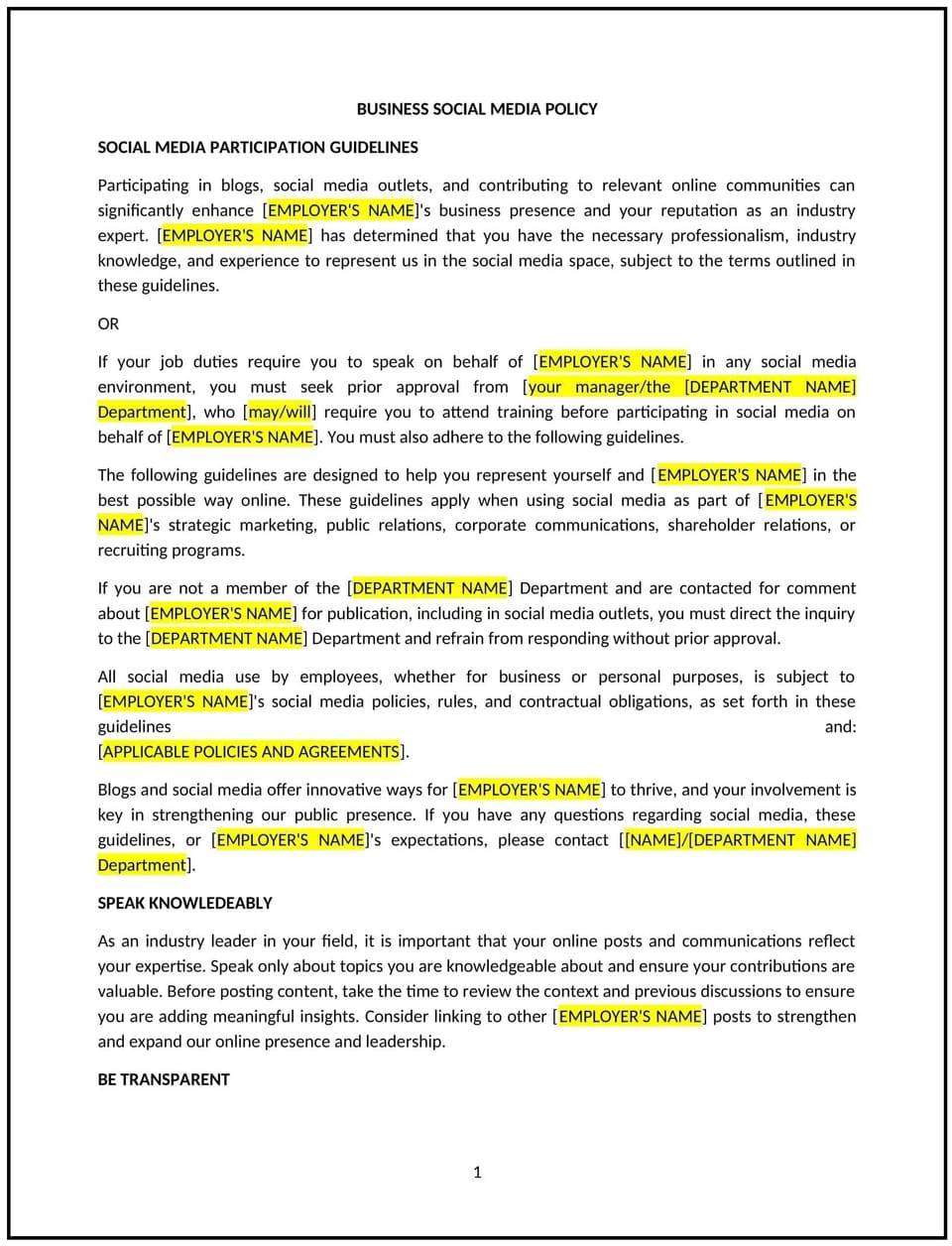Business social media (California): Free template

Business social media policy (California)
In California, a business social media policy provides guidelines for employees using social media in a professional or personal capacity. This policy establishes expectations for appropriate behavior, protecting the business’s reputation while respecting employees’ rights under California labor laws, including protections for lawful off-duty conduct.
This policy outlines acceptable use, content guidelines, and potential consequences for misuse. By implementing this policy, California businesses can mitigate risks, support compliance, and maintain a professional online presence.
How to use this business social media policy (California)
- Define acceptable use: Clearly outline how employees can reference or represent the business on personal or professional social media accounts.
- Set content standards: Provide guidelines for posts involving business information, such as prohibiting the sharing of confidential or proprietary data.
- Protect employee rights: Ensure the policy respects California laws that safeguard lawful off-duty conduct and free speech rights.
- Address consequences: Specify disciplinary actions for misuse, such as posting false, defamatory, or damaging content about the business or colleagues.
- Promote awareness: Educate employees about the policy and the importance of maintaining professionalism online.
Benefits of using this business social media policy (California)
This policy offers several advantages for California businesses:
- Protects reputation: Establishes clear expectations to reduce the risk of harmful or unprofessional content affecting the business.
- Supports compliance: Reflects California-specific laws protecting employees’ rights while managing social media use responsibly.
- Enhances accountability: Provides guidelines for employees to navigate social media while maintaining professionalism.
- Promotes consistency: Ensures employees representing the business online maintain a unified and positive image.
- Reduces risks: Helps prevent legal disputes, data breaches, or reputational harm caused by social media misuse.
Tips for using this business social media policy (California)
- Address California-specific considerations: Reflect labor laws that protect lawful off-duty conduct, ensuring the policy does not overreach.
- Train employees: Provide training on acceptable use and the potential impact of social media posts on the business.
- Monitor appropriately: Use monitoring tools cautiously to align with California privacy laws.
- Separate personal and professional: Encourage employees to maintain separate accounts for personal and professional use if they engage on behalf of the business.
- Review regularly: Update the policy to reflect changes in California laws, social media trends, or business needs.
Q: How does this policy benefit the business?
A: This policy protects the business’s reputation, supports compliance with California labor laws, and provides employees with clear social media usage guidelines.
Q: What types of social media posts are prohibited under this policy?
A: Prohibited posts include sharing confidential information, making defamatory statements about the business or colleagues, or engaging in behavior that could harm the business’s reputation.
Q: How does this policy support compliance with California laws?
A: The policy respects employee rights under California labor laws while providing guidelines for appropriate and professional social media use.
Q: What steps should employees take if they are posting about the business online?
A: Employees should follow content guidelines outlined in the policy, disclose their affiliation when necessary, and avoid sharing confidential or sensitive information.
Q: How can the business handle misuse of social media?
A: The business can follow the disciplinary procedures outlined in the policy, such as issuing warnings, requiring corrective action, or, in severe cases, termination.
This article contains general legal information and does not contain legal advice. Cobrief is not a law firm or a substitute for an attorney or law firm. The law is complex and changes often. For legal advice, please ask a lawyer.


